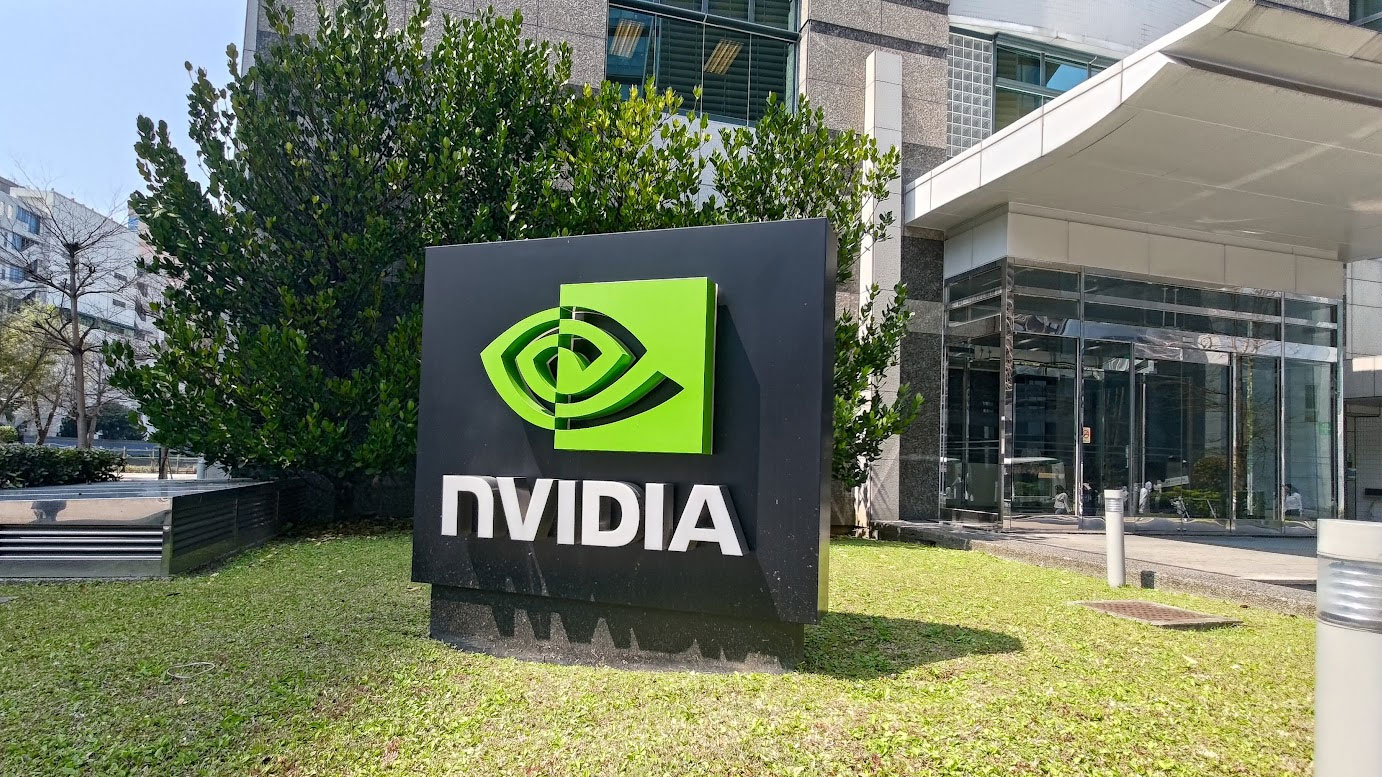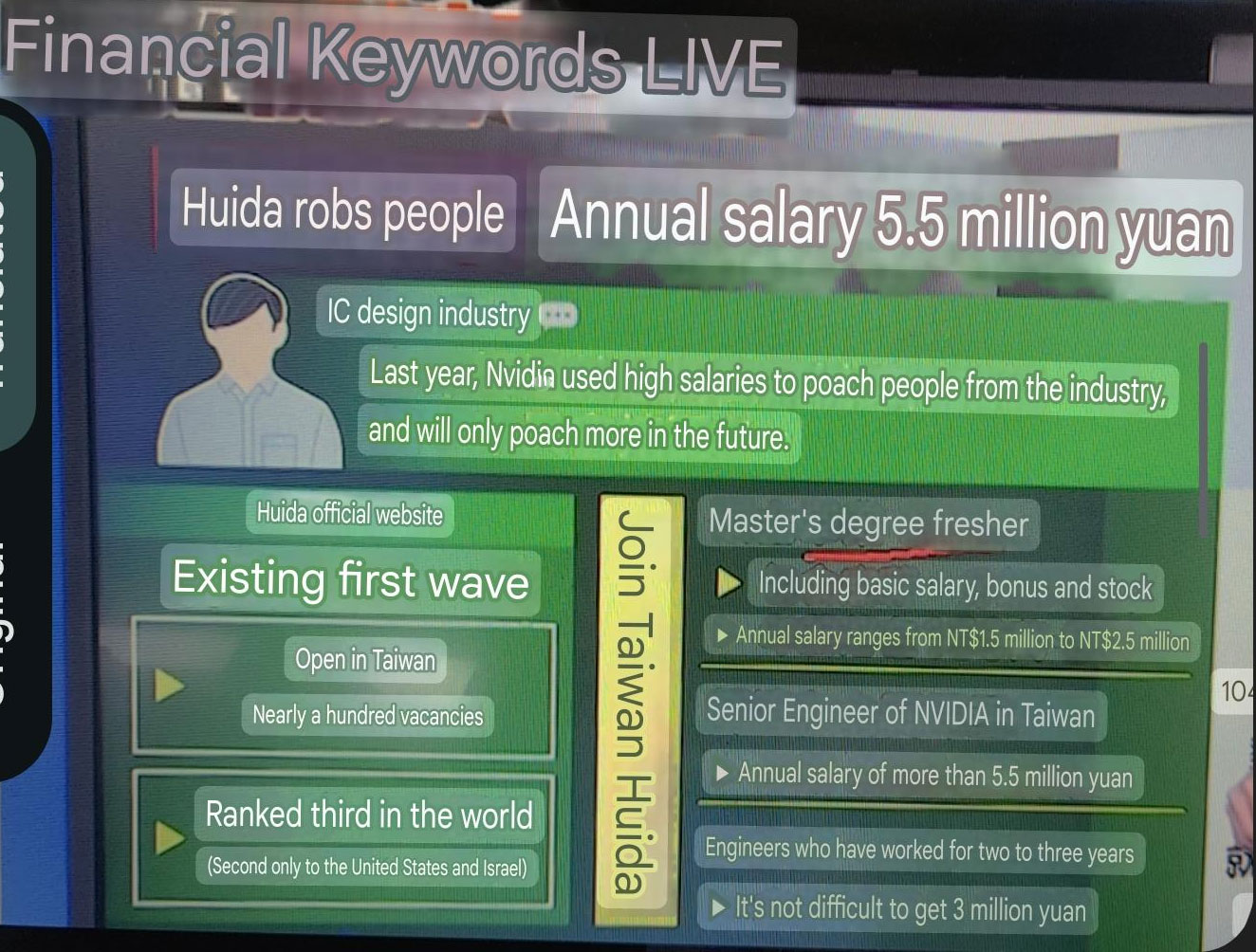Nvidia accused of poaching TSMC engineers in Taiwan – up to $180,000 salaries offered for talent
The green team desperately needs more staff to fuel its second R&D center on the island.

The media in Taiwan have highlighted the lucrative compensation packages purportedly being used to tempt engineers to fill key roles and fuel Nvidia’s ambitious expansion plans. Senior engineers should aim to get more than NTD$5.5 million per annum, reports Taiwan’s EBC News (via Ray Wang on X). Converted to USD, that’s less than $185,000 annually, but potential employees will also be eyeing the traditional annual bonuses given to Taiwanese tech employees, and some enviable stock options.
Readers will probably be aware that Nvidia is tipped to open a second R&D center on the Silicon Island. Nvidia will need the most highly skilled personnel to make the most of this new facility, and that doesn’t come cheap.

We have taken a closer look at the data shared via the wonders of machine translation (see above). The news in Taiwan certainly seems spicy, with the translation suggesting “Nvidia robs people,” but that is explained in more business-like terms elsewhere in the infographic: “Last year, Nvidia used high salaries to poach people from the industry.”
Nvidia’s efforts to acquire more skilled engineers will have to continue apace, due to the R&D expansion plans. Nvidia postings on the company's jobsite, reviewed by Tom's Hardware, indicate the company has 97 jobs available in the country at the time of posting.
The grades and the salaries
The headlining salary of NTD$5.5 million $185,000 per annum, is what EBC News says is being offered to poach or retain senior engineers. For an engineer with perhaps just two to three years' experience, the source hints that NTD$3 million (about $100,000) isn’t hard to achieve. Last but not least, a postgrad (Master's level) engineer joining Nvidia fresh from their studies should be able to ask for a salary between NTD$1.5 to 2 million (roughly $50,000 to $83,000).
Remember, these salaries might seem low depending on where you live, but we should factor in some very generous annual bonuses traditionally given to Taiwanese tech employees, plus the potential of great stock options. The cost of living isn’t bad in Taiwan, either. Numbeo data indicates that living in Taiwan is 24.9% cheaper than living in the U.S., excluding rent, or 37.9% cheaper when rent is factored in.
Taiwanese media has a relatively strong tech focus, and everyday news programs mix in lots of stories about companies such as TSMC, MediaTek, Acer, Asus, and others. Thus, alongside news of the latest soap star’s sex scandal, you will see nuggets about the aforementioned companies, the semiconductor industry in general, (mostly tech) stocks and shares, and even the discussion of tech like CoWoS, HBM, and High-NA EUV. Oh, there’s plenty of politics too, and always something about China’s latest saber-rattling activities around the island.
Get Tom's Hardware's best news and in-depth reviews, straight to your inbox.
Follow Tom's Hardware on Google News to get our up-to-date news, analysis, and reviews in your feeds. Make sure to click the Follow button.

Mark Tyson is a news editor at Tom's Hardware. He enjoys covering the full breadth of PC tech; from business and semiconductor design to products approaching the edge of reason.
-
logainofhades How is this news? Companies do this all the time. If you want top talent, you gotta pay for it.Reply -
Marlin1975 Replylogainofhades said:How is this news? Companies do this all the time. If you want top talent, you gotta pay for it.
Because they are calling it as a bad thing.
Its still frowned upon by some companies to do so. Hence why we had to make that illegal to do in the US even though many still do it. -
thesyndrome Is this story meant to imply that TSMC are poor and can't afford to pay their employees a higher salary to keep them from going to Nvidia? The company that EVERY big tech company is bidding for to use their nodes and fabs?Reply
After looking it up, TSMC's market cap is 25 trillion TWD, and Nvidia's market cap (after conversion) is 29 trillion TWD, so it's not like a giant company is bullying a much smaller one that has half it's market cap or less, Nvidia is only about 10% bigger.
I'm just a bit confused at how this is being framed as a bad thing? A higher pay is incentive to change jobs; I'm not Nvidia's biggest fan at the moment, but of all the things to criticize them for, I don't think "they are offering to pay people more" is one of them -
GenericUser2001 I really dislike the term "poaching" (which historically meant hunting animals on land that did not belong to you, and in more modern times means hunting animals without gov permits) being used for companies offering higher wages to attract workers from other companies. Companies have no legitimate claim of ownership over their employees.Reply -
DS426 Offering whatever salary & compensation claims and benefits packages isn't employee poaching -- it's exactly how business is run today (passive listings), fair, ethical, and benefits the labor force. Poaching is active stuff like recruiters at nVidia calling TSMC employees and offering interviews and job offers. I don't see anything like that or otherwise true "poaching" happening, although I would be surprised if it isn't happening.Reply
TSMC pays their employees well, but they also require long, demanding hours. Not everyone wants or can afford that, like many parents (even if an employer has on-site daycare services or vouchers). -
DougMcC Reply
Agree. Offering higher salaries is not poaching. Poaching is stuff like fraudulently or even illegally entering the building and trying to talk engineers into coming to your company (things that have actually happened, but not offered into evidence in this case).GenericUser2001 said:I really dislike the term "poaching" (which historically meant hunting animals on land that did not belong to you, and in more modern times means hunting animals without gov permits) being used for companies offering higher wages to attract workers from other companies. Companies have no legitimate claim of ownership over their employees. -
thestryker Reply
I don't know where you're coming up with your numbers, but nvidia's market cap is over 3x TSMC's (~$3.6t vs ~$1t in USD). Of course that doesn't make TSMC an actual underdog as they're in the top 20 or so worldwide still just wanted to correct the mistake here.thesyndrome said:After looking it up, TSMC's market cap is 25 trillion TWD, and Nvidia's market cap (after conversion) is 29 trillion TWD, so it's not like a giant company is bullying a much smaller one that has half it's market cap or less, Nvidia is only about 10% bigger. -
Elusive Ruse TSMC is angry they can’t keep paying their skilled workers slave wages, I say good for those engineers who get better pay and bonuses at Nvidia.Reply -
DSzymborski Eh, languages are all full of colorful language of this type that is used innocuously even if it could seem inappropriate when randomly pondering it. Hiring someone is also not *really* the same as "headhunting." Nvidia isn't really committing "highway robbery" nor did anyone exchange "an arm and a leg" for a 5090. Someone getting fired is not really "getting the axe." An idea your boss doesn't agree with wasn't actually "shot down" and if they liked it, you're not really "killing it." You may have "skeletons in your closet," but they consist of secrets, not typically corpses who have been in there long enough for the flesh to fully decompose.Reply
I'd say more, but I have a "deadline" for a piece I'm writing, and I don't want my editor to shoot me dead like an American Civil War prisoner who walked over a line drawn on the ground, which is the origin of the word. -
renz496 Reply
But Nvidia is not even competing with TSMC in foundry market.Marlin1975 said:Because they are calling it as a bad thing.
Its still frowned upon by some companies to do so. Hence why we had to make that illegal to do in the US even though many still do it.